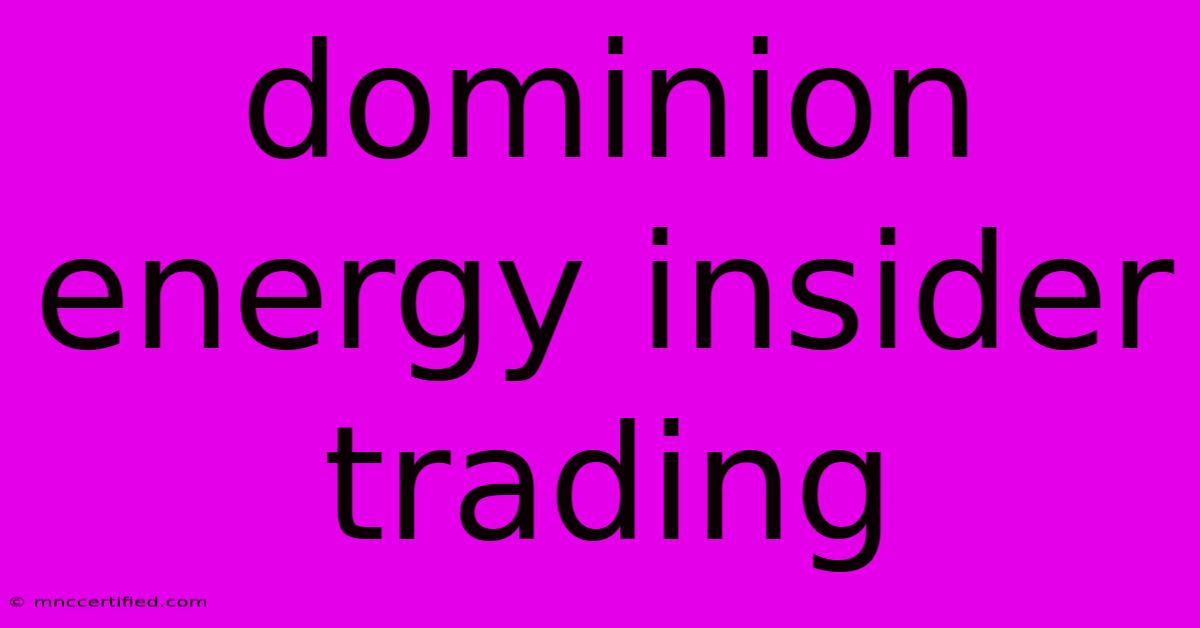Dominion Energy Insider Trading

Table of Contents
Dominion Energy Insider Trading: Unpacking the Allegations and Implications
The energy sector, a cornerstone of any economy, is often subject to intense scrutiny, particularly when allegations of insider trading surface. Dominion Energy, a prominent player in the US energy landscape, has faced its share of such accusations. This article delves into the complexities surrounding insider trading allegations at Dominion Energy, exploring the potential implications and the importance of regulatory oversight in maintaining market integrity.
Understanding Insider Trading
Before examining specific allegations against Dominion Energy, let's define insider trading. Simply put, insider trading involves the buying or selling of a publicly traded company's stock based on material, non-public information. This information, if known to the public, could significantly impact the stock price. The illegality stems from the unfair advantage it provides to those with access to this privileged knowledge. Penalties for insider trading can be severe, including hefty fines and imprisonment.
Key Elements of Insider Trading Cases:
- Material Non-Public Information (MNPI): This is the crucial element. The information must be significant enough to affect a reasonable investor's decision to buy, sell, or hold the stock.
- Breach of Fiduciary Duty: Often, insider trading involves a breach of trust. Individuals who possess MNPI due to their position within a company have a fiduciary duty not to misuse that information for personal gain.
- Scienter: This legal term refers to the intent or knowledge of wrongdoing. Prosecutors need to prove that the individual acted knowingly and intentionally.
Dominion Energy and Allegations of Insider Trading: A Deep Dive
While Dominion Energy hasn't been directly implicated in a major, widely publicized insider trading scandal, it's crucial to acknowledge that the energy sector is inherently susceptible to such activity. The complexities of energy markets, mergers and acquisitions, and regulatory changes create fertile ground for potential misuse of information.
Several factors contribute to this vulnerability:
- Complex Regulatory Landscape: The energy industry is heavily regulated, with frequent changes that can significantly impact stock prices. Those with advance knowledge of these changes could potentially profit unfairly.
- Mergers and Acquisitions: Large-scale mergers and acquisitions in the energy sector are frequent. Information regarding these deals, before public announcement, can be incredibly valuable for insider trading.
- Project Announcements: Announcements regarding new energy projects, pipelines, or power plants can dramatically affect a company's stock price. Early knowledge of such announcements presents opportunities for illegal profit.
Investigative Approaches and Regulatory Scrutiny:
Investigating insider trading is complex and often requires sophisticated techniques. Regulatory bodies like the Securities and Exchange Commission (SEC) utilize various methods, including:
- Monitoring Trading Patterns: Analyzing unusual trading activity around significant events can be an early indicator of potential insider trading.
- Whistleblower Reports: Information from employees or others with knowledge of potentially illegal activity is crucial for investigations.
- Financial Analysis: Examining financial records and comparing them with trading activity can reveal suspicious patterns.
The Importance of Corporate Governance and Ethical Conduct
To prevent insider trading, strong corporate governance is paramount. Dominion Energy, like other publicly traded companies, should prioritize:
- Robust Insider Trading Policies: Clear, well-defined policies that outline prohibited activities and establish reporting procedures are essential.
- Compliance Training: Regular training for employees on insider trading regulations and ethical conduct is crucial.
- Independent Oversight: A strong and independent audit committee can play a critical role in monitoring compliance and investigating potential violations.
Conclusion: Maintaining Market Integrity
Allegations of insider trading, even if unsubstantiated, can severely damage a company's reputation and investor confidence. Maintaining ethical conduct and robust internal controls are not just legal requirements; they are crucial for long-term sustainability and success. For Dominion Energy and other companies in the energy sector, vigilance and proactive measures to prevent insider trading are vital for preserving the integrity of the market and fostering investor trust. Continuous monitoring, strong regulatory oversight, and a commitment to ethical practices are key to navigating the complexities of the energy sector and avoiding the significant repercussions of insider trading.

Thank you for visiting our website wich cover about Dominion Energy Insider Trading. We hope the information provided has been useful to you. Feel free to contact us if you have any questions or need further assistance. See you next time and dont miss to bookmark.
Featured Posts
-
Adele Reveals Post Concert Plans
Nov 26, 2024
-
Thanksgiving Winter Weather Fox Update
Nov 26, 2024
-
Lana Del Rey Glasgow Concert Hampden Park
Nov 26, 2024
-
Lana Del Rey Hampden Park Glasgow 2024
Nov 26, 2024
-
Is Rolfing Covered By Insurance
Nov 26, 2024